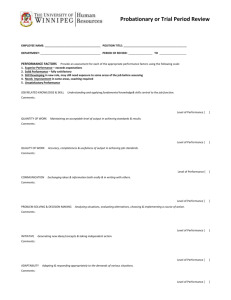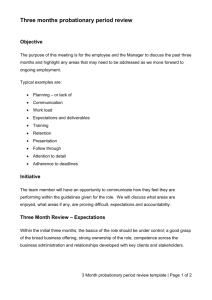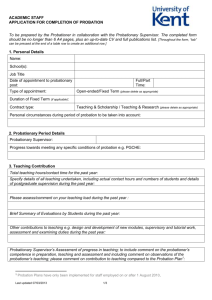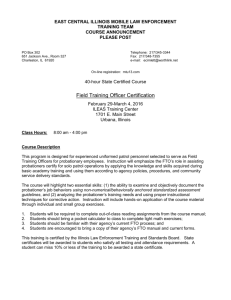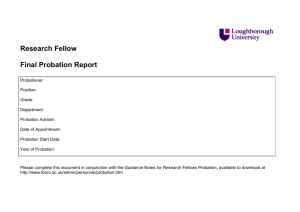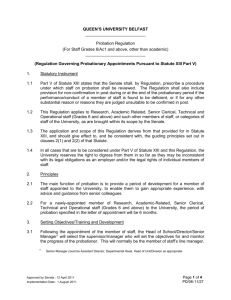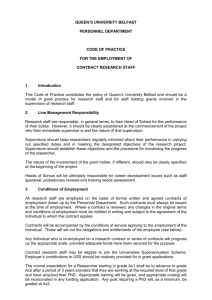Grades 6 and above
advertisement
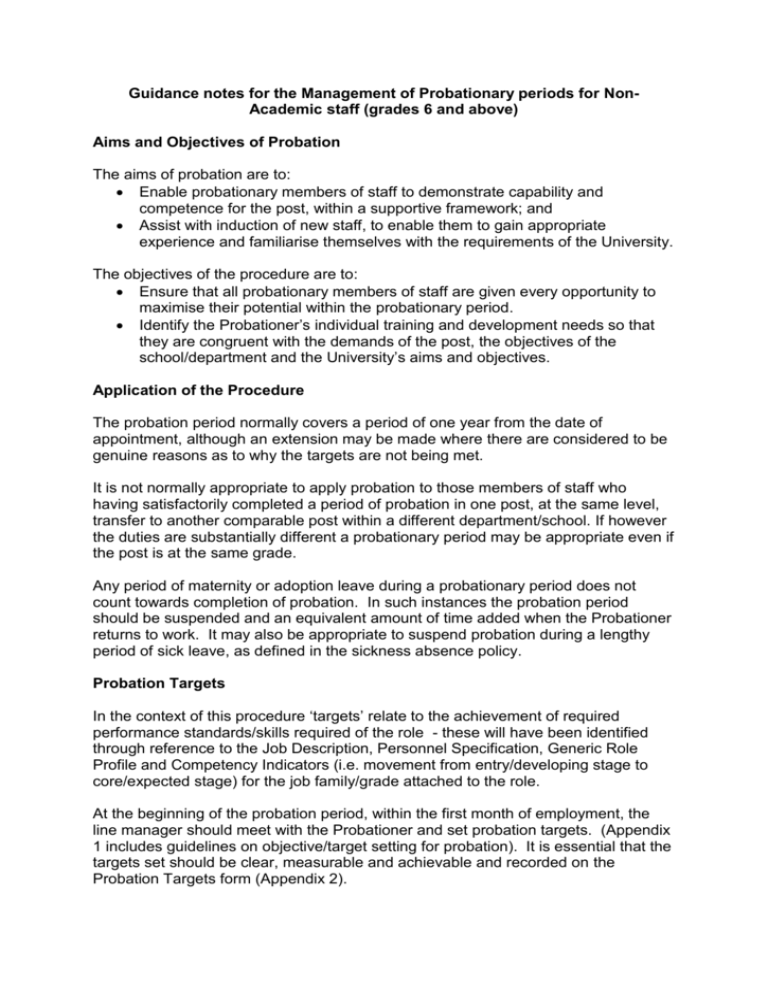
Guidance notes for the Management of Probationary periods for NonAcademic staff (grades 6 and above) Aims and Objectives of Probation The aims of probation are to: Enable probationary members of staff to demonstrate capability and competence for the post, within a supportive framework; and Assist with induction of new staff, to enable them to gain appropriate experience and familiarise themselves with the requirements of the University. The objectives of the procedure are to: Ensure that all probationary members of staff are given every opportunity to maximise their potential within the probationary period. Identify the Probationer’s individual training and development needs so that they are congruent with the demands of the post, the objectives of the school/department and the University’s aims and objectives. Application of the Procedure The probation period normally covers a period of one year from the date of appointment, although an extension may be made where there are considered to be genuine reasons as to why the targets are not being met. It is not normally appropriate to apply probation to those members of staff who having satisfactorily completed a period of probation in one post, at the same level, transfer to another comparable post within a different department/school. If however the duties are substantially different a probationary period may be appropriate even if the post is at the same grade. Any period of maternity or adoption leave during a probationary period does not count towards completion of probation. In such instances the probation period should be suspended and an equivalent amount of time added when the Probationer returns to work. It may also be appropriate to suspend probation during a lengthy period of sick leave, as defined in the sickness absence policy. Probation Targets In the context of this procedure ‘targets’ relate to the achievement of required performance standards/skills required of the role - these will have been identified through reference to the Job Description, Personnel Specification, Generic Role Profile and Competency Indicators (i.e. movement from entry/developing stage to core/expected stage) for the job family/grade attached to the role. At the beginning of the probation period, within the first month of employment, the line manager should meet with the Probationer and set probation targets. (Appendix 1 includes guidelines on objective/target setting for probation). It is essential that the targets set should be clear, measurable and achievable and recorded on the Probation Targets form (Appendix 2). This will enable the Probationer to have a full understanding of what will be required to assess whether s/he has achieved the required standard of performance over the probationary period. At specified periods during the probationary period (normally at the end of 6 and 11 months) the line manager will formally review the performance of the Probationer against the targets set at the beginning of the probation period. (Appendix 3 includes the Business Support Staff Probation Review Form) Where progress towards meeting the targets at the formal 6 month review point is not satisfactory informal reviews of progress will be more frequent; where any deficiencies in performance have been identified and advice given to help facilitate improvements, giving adequate time to improve. Where deficiencies have been discussed, the Probationer should be advised of these in writing and of the potential outcome i.e. failure to successfully complete probation and termination of employment. Responsibilities The Induction colleague: An appropriately experienced member of staff will be appointed as an Induction colleague to assist the Probationer with their new role. The Induction colleague will be expected to meet regularly with the Probationer to give guidance and help on all aspects of work, but would not be expected to formally report on progress. (Appendix 4 – identifies the role of the Induction colleague). The Head of Department: Will determine/nominate who will be responsible for overseeing the probationary process for the new member of staff and may choose who will act as their Induction colleague. Line Manager: Should be sensitive to issues of equality and diversity and adopt their approach accordingly. Will meet the Probationer within the first month to clarify their duties and responsibilities, plan and agree the targets to be achieved during the probationary period; identify any training and development needs. Agree and set dates for the probation review meeting at the 6 and 11 month stages. Continuously review the Probationer’s performance, reviewing progress towards the set targets and training/development needs through the formal review meetings as well as more frequent on-the-job discussion. Communicate regularly with the Probationer about their work throughout the year, giving open, honest, constructive feedback on performance at the time it occurs and at the review meetings. Raise issues of underperformance during the probation period with the nominated HR Business Partner for the School/Department in order to ensure remedial action is taken as appropriate. Ensure that the Probationer is fully aware of the probation reports to be submitted to the Human Resources department following each formal review meeting. Human Resources Will notify Heads of Department/Schools of the requirement to complete probation target forms within the first month of appointment. To request formal review reports following the 6 and 11month reviews. To advise the Probationer of their satisfactory completion, or otherwise, of the probationary period of employment. Procedure where Progress is Satisfactory At the end of 6 months from the commencement of appointment the first review meeting should be held between the Probationer and the line manager to review the performance of the Probationer against the targets set. All meetings should be a two way dialogue in which the probationer is given the opportunity to highlight issues which may help in their development during the probationary period. A record of this review should be kept stating: o Whether satisfactory progress has been made toward targets. o If progress is not satisfactory, outlining areas for improvement and any remedial action necessary, including any additional review meetings. o Any changes to the probationary targets. This record should be signed by the Probationer and the line manager and submitted to the Head of Department and Human Resources Department. A final review will be held at the end of 11 months from the commencement of the Probationer’s appointment between the Probationer and the line manager to review the performance of the Probationer against the targets set. A record of this review should be made as outlined previously for the interim review. Following receipt of the 11 month review the Human Resources department will write to the Probationer to confirm their appointment. Procedure where Progress is Unsatisfactory In cases where there is concern about lack of progress the Line Manager should immediately contact the nominated HR Business Partner for the area to highlight potential problems and seek appropriate advice/guidance on how to deal with such matters. If at the 6 monthly review the Line Manager is concerned about lack of progress which may lead to non-confirmation of appointment this should be brought to the attention of the Probationer by the Line Manager. Also the Line Manager will advise the Probationer of such remedial action as is necessary to improve their performance and set a timescale to enable the Probationer to achieve the required improvement and informal review dates. Should progress still continue to be unsatisfactory at the 11 month review, the Line Manager must advise the Probationer of this and arrange a meeting, giving them 5 working days notice, outlining the purpose of the meeting. The meeting should refer to the evidence gathered on the lack of progress to include the number and dates of any informal meetings and the Probationer will be given an opportunity to respond. A representative from Human Resources should also be in attendance at this meeting and the Probationer may be accompanied by a work colleague or a trade union representative at this meeting and will be given the opportunity to present their case, including any mitigating circumstances. All meetings should be a two way dialogue in which the probationer is given the opportunity to highlight issues which may help in their development during the probationary period (including extension, if appropriate.) Following this meeting the Line Manager may decide: o that the probationary period may be extended for a further period of up to 6 months, on the understanding that only one extension1 may be granted; or o that the appointment is not confirmed at the end of the probationary period and therefore their employment is terminated. Following the final review meeting, Human Resources will within 5 working days, notify the Probationer, in writing, of the reasons for the extended probationary period, outlining what improvement is expected during this extended period and informing them that only one extension to the probationary period may be granted; or notify the Probationer that their employment will be terminated at the end of the probationary period, confirming their final date of employment. In either case the Probationer will be informed of their right of appeal against this decision. Appeal The Probationer will have the right to appeal the decision to have their probation extended or the termination of employment. This appeal should outline the grounds on which the appeal is based, and be submitted in writing to the Head of Department within 5 working days from the date of the letter of notification. However, if the Head of Department is the Probationers line manager, then an appropriate other person at the same level will be appointed by Human Resources to hear the appeal. In such instances the grounds of the appeal should be submitted in writing to Human Resources within the above timeframe. The Head of Department (or appropriate other person) will convene a meeting, normally within 5 working days, inviting the Line Manager and Probationer to attend and will consider the evidence provided by both parties. The Probationer must take all reasonable steps to attend the appeal meeting and/or any adjournment or postponement of such meeting. If the Probationer or the Probationer’s chosen work colleague or trade union representative cannot attend at the time specified for the meeting, the Probationer must inform the University’s Human Resources Department immediately, and the University will make reasonable efforts to arrange an alternative time. Normally only one postponement will be granted. A representative from Human Resources will be in attendance and the Probationer may be accompanied by a work colleague or a trade union representative at this meeting. 1 Extensions to the probationary period can only be granted in very exceptional circumstances. Normally if performance remains unsatisfactory at the end of the 12 months probationary period employment will be terminated. Extensions are only appropriate where there has been a very significant improvement in performance since the preliminary review meeting and it is reasonable to expect that the required standard will be achieved within the extension to the probationary period. Following the meeting the Head of Department (or appropriate other person) will communicate their decision in writing, within 5 working days, to the Probationer. The decision of the Head of Department (or appropriate other person) will be final. July 2012 Appendix 1 Guidelines for Setting Targets SMART Objectives Please note that in the context of this procedure ‘Targets’ relates to objectives or the achievement of competencies. Wherever possible probation targets should be: Specific Measurable Attainable Resourced, and Timescaled. Specific: Targets should be concerned with the specific activities of the Probationer over the first twelve months of their employment. They should be specific rather than vague generalisations open for interpretation by all parties. The targets will relate not only to the targets of the role but also the targets of the department. The targets should be challenging, designed to achieve performance and not simply a list of duties. Measurable: Targets should be clear and easily measured. When setting targets and reviewing results, the line manager needs to look out for potential areas of conflict. It is important to minimise any conflict between targets and to avoid mutually exclusive ones. As a general principle, the line manager, when setting a target should think about how they would know whether it has been met by the end of the probationary period. Attainable: Realistic targets should be set at the first and if appropriate subsequent probation meetings. Some work projects may extend beyond the twelve months of the probationary period. In these cases it will be necessary to break the project down for the purpose of setting targets, considering what can realistically be achieved during the probationary period. Resourced: Appropriate consideration should be given to available resources to facilitate set objectives. Timescaled: During the probationary period some of the targets set may be achievable during the first few months of employment whereas other objectives may only be achievable within the year. Review meetings should be arranged at appropriate points throughout the probationary year to reflect the timescale of the targets set. Reference to Competency Indicators2 When setting the probationary targets cognisance should be taken of the ‘key’ competency indicators depending upon the grade and job family; aiming for the probationary member of staff to progress from the entry/developing stage (i.e. stage 1) to the core/expected stage (i.e. stage 2) by the completion of the probationary period. 2 For staff in the Research Job Family reference should be made to the relevant Generic Role Profile dependent upon the grade attached to the post. Appendix 2 University of Ulster Non Academic Staff Probation Targets Form (Grades 6 and above) Name (Probationer): Date of Appointment: Job Title: Department: Line Manager: TO BE COMPLETED BY THE LINE MANAGER AND PROBATIONER DURING THE FIRST MONTH OF THE PROBATIONER’S APPOINTMENT. Please summarise the targets to be achieved during the probationary period. These should relate to the expectations in the Job Description/Personnel Specification & Generic Role Profile/Competency Indicators relevant to the grade and job family. Please indicate the timescale for the completion of each objective. Please list any on-the-job training needs that have been identified and, possible induction support interventions to be considered. Preliminary Review Meeting Due: (at end of 6 months) Final Review Meeting Due: (at end of 11 months) Signed: _________________________________ (Probationer) Date: ________________________ Signed: _________________________________ (Line Manager) Date: _________________________ Copy to be retained by the Line Manager, with a copy to the Probationer and a copy forwarded to Human Resources for record purposes. Appendix 3 University of Ulster Non Academic Staff Probation Review Form (Grades 6 and above) Name: Date of Appointment: Job Title: Department: Line Manager: Date of Review: (6 Month or 11 Month or Other*) *Please delete as appropriate To be completed by the Probationer and the Line Manager during the Review Meeting Is the probationary member of staff making satisfactory progress towards the targets Yes/No set following appointment? Comments (Please comment on each target identified on the Probation Targets form): Is the probationary member of staff making satisfactory progress towards the training needs identified following appointment? Comments: Is there a need to revise the targets/training needs initially identified or to offer the probationary member of staff additional support? Comments: Is the probationary member of staff making satisfactory progress within the performance of the role? Areas of General Performance Execution of responsibilities as detailed in the Job Description (attach) Ability to plan and manage priorities to achieve objectives set Ability to initiate and build effective relationships with others Ability to communicate effectively with others Attendance Number of days absence Comments: Yes/No Yes/No Yes/No Assessment Satisfactory Unsatisfactory Days Signed: ____________________________ (Probationer) Date: _____________________ Preliminary Review I consider that ______________________ is making /not making* satisfactory progress during their probationary period, the next review meeting is scheduled for _________________. (*delete as appropriate) If unsatisfactory, the following remedial action is necessary: Final Review I confirm that __________________ has met/not met* the targets of their probation and should/should not* be confirmed in post or extend* their probationary period for ____ months. (*delete as appropriate) Signed: ___________________________ (Line Manager) Date: _____________________ Copy to be retained by the Line Manager, with a copy to the Probationer and a copy forwarded to Human Resources for record purposes. Notes on Completion In preparing the report(s) the line manager should meet with the probationer, taking cognisance of the probation targets and training needs identified and agreed at the Probation Target meeting. The report must be signed off by the probationer and the line manager. On receipt of the final report, where progress has been satisfactory, confirmation of the probationary period will be sent, by the Human Resources Department, to the member of staff concerned. If at the preliminary review meeting the probationer is not making satisfactory progress toward the targets and training needs identified the line manager must: Identify and record any area(s) in which the achievement of the targets set is less than satisfactory. Specify or reaffirm and agree with the probationer the areas for improvement and any remedial action necessary along with any changes to the probationary targets. If at the final review meeting the probationer is not making satisfactory progress towards the targets and training needs identified or has not improved in relation to the redefined criteria identified at the preliminary review meeting, the line manager must decide if: the probationary period may be extended for a further period of up to 6 months, on the understanding that only one extension3 may be granted; or the appointment not be confirmed. When Human Resources receive a report indicating continuing dissatisfaction at the 11 month review they will: Notify the member of staff that their probationary period may be extended, only on one occasion, for a further period of up to 6 months or their employment will be terminated at the end of the probationary period and advise them of their right to appeal. Appendix 4 3 Extensions to the probationary period can only be granted in very exceptional circumstances. Normally if performance remains unsatisfactory at the end of the 12 months probationary period employment will be terminated. Extensions are only appropriate where there has been a very significant improvement in performance since the preliminary review meeting and it is reasonable to expect that the required standard will be achieved within the extension to the probationary period The Role of the Induction Colleague The role of the Induction colleague is to share their experience and knowledge to enable a new colleague (i.e. the Probationer) to develop in their role and to familiarise themselves with the requirements of the University during the probationary period. The Induction colleague will be involved throughout the probationary period – on an informal basis, for example in the following areas: • • • • • • Observation and hands-on experience of work tasks Instruction in work processes Information, advice and guidance on Departmental, Faculty or School procedures Reference onward to other sources of information and help A sounding board for the Probationer’s reflection on experience Encouragement to take up learning opportunities within the University.
